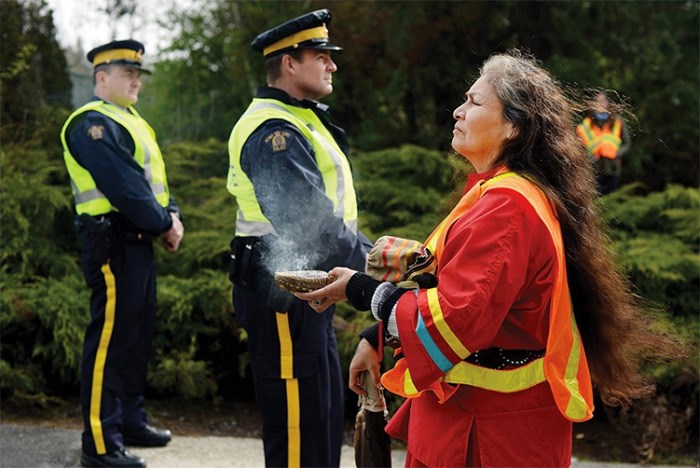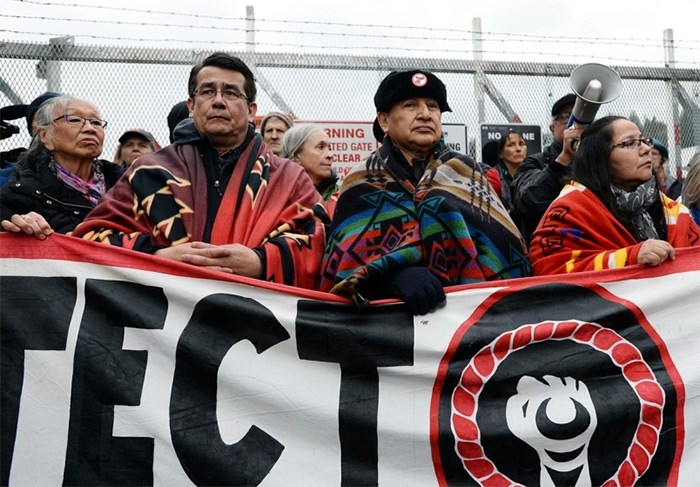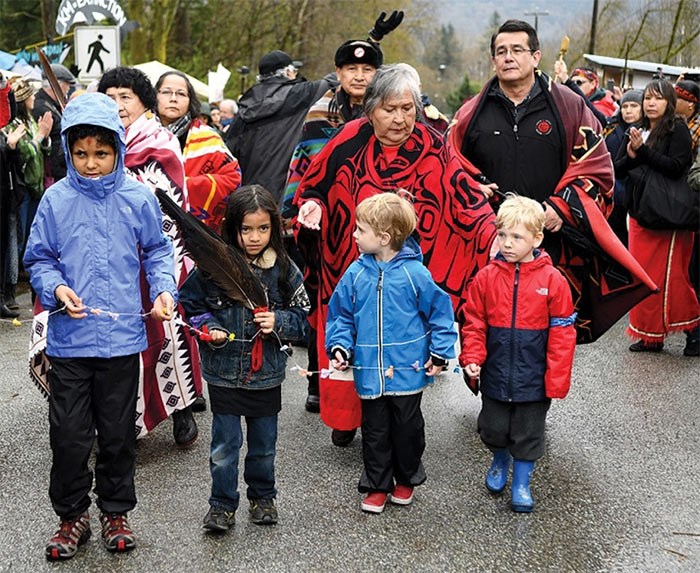 Cynthia Myran protests against the Kinder Morgan pipeline expansion project April 14. photo Jennifer Gauthier, Burnaby Now
Cynthia Myran protests against the Kinder Morgan pipeline expansion project April 14. photo Jennifer Gauthier, Burnaby Now
Leaders of local First Nations including the Squamish, Tsleil-Waututh and the Union of B.C. Indian Chiefs have vowed to stop Kinder Morgan’s Trans Mountain pipeline expansion, a day after Prime Minister Justin Trudeau insisted the project will be built.
Indigenous leaders and protesters held a news conference Monday in downtown Vancouver in which they criticized Trudeau for breaking promises to First Nations and vowed to fight the pipeline based on indigenous rights and title.
Dustin Rivers, an elected Squamish councillor and spokesman for the band council who goes by the traditional name Khelsilem, said the pipeline and planned tanker traffic “have not met our consent as a nation,” adding “this project has not been in our interests.”
Khelsilem said Trudeau has “completely failed” to honour promises he made to First Nations during the last federal election campaign.
“We take all the risk but (see) no benefit and that’s the truth,” said Rueben George, spokesman for the Tsleil-Waututh Nation on the pipeline issue.
“We’re not going to back down. In fact we’re going to ramp it up there,” said Will George, a Tsleil-Waututh member who has been occupying a traditional “watch house” built next to the area where Kinder Morgan has been preparing for work on the pipeline. “We’re going to stay there until (the project) is absolutely dead.”
 Grand Chief Stewart Phillip, president of the Union of B.C. Indian Chiefs, on the protest lines in Burnaby, April 7. – Jennifer Gauthier
Grand Chief Stewart Phillip, president of the Union of B.C. Indian Chiefs, on the protest lines in Burnaby, April 7. – Jennifer Gauthier
Comments from the local First Nations came a day after an emergency summit over the pipeline held Sunday between Trudeau, B.C. Premier John Horgan and Alberta Premier Rachel Notley.
Trudeau emerged from that saying the pipeline will be built and confirming Ottawa will provide Kinder Morgan Canada with financial assurances to reduce the company's risks on the $7.5-billion project.
Trudeau added Ottawa is “actively pursuing legislative options that will assert, plus reinforce, the Government of Canada's jurisdiction in this matter, which we know we clearly have.”
But at Monday’s press conference, indigenous leaders said Trudeau is displaying a “colonial” mentality and forgetting about indigenous rights and title that have been upheld by Canada’s top court.
Chief Bob Chamberlin, vice-president of the Union of B.C. Indian Chiefs, said Trudeau’s attitude is part of a longstanding pattern in which government has “systematically disregarded aboriginal rights” while exploiting natural resources for the benefit of others.
“The dead goat lies at the doorstep of the prime minister,” said Grand Chief Stewart Phillip, president of the Union of B.C. Indian Chiefs.
Indigenous people have not provided social licence for the project to proceed, he said.
Phillip added protests over Trans Mountain are likely to be similar to a “Clayoquot Sound scenario unfolding.”
Most of those arrested so far have not been native.
But Tsleil-Waututh elder Amy George said fears over the future her great-grandchildren will inherit make her willing to risk it.
“It’s not in my genes, it’s not in my character, it’s not in my heart or my spirit to give up,” she said. “Anything they do, I’ve been through it before. My people have been through it before,” she said.
George said she wants to be able to say to her great-grandchildren, “I did enough” to stop the pipeline.
 Tsleil-Waututh elder Amy George takes part in a protest against the Kinder Morgan pipeline expansion April 7. – photo Jennifer Gauthier, Burnaby Now
Tsleil-Waututh elder Amy George takes part in a protest against the Kinder Morgan pipeline expansion April 7. – photo Jennifer Gauthier, Burnaby Now
Following Sunday’s meeting, Horgan said he will continue to defend B.C.'s interests, which includes fighting the project in court, and Notley said her government plans to introduce legislation later this week that will give Alberta more tools to control exports, including oil and refined fuel products -- something it could use as a trade tool against B.C.
On April 8, the company announced it planned to stop all but “essential work” on the project, and gave the Canadian government until May 31 to give it the "clarity" it needs, or it would cancel the project.
Alberta's response has been to threaten retaliation, possibly by throttling the flow of oil and refined fuel products to B.C., triggering concerns that both a trade war and constitutional crisis may erupt.
According to the province, a total of 1,187 permits are needed from various government ministries and agencies. To date, the government says Trans Mountain has submitted 587 permit applications, of which 201 have been approved and issued. The remainder are still under review. Another 600 permits have yet to be requested by Trans Mountain.
Reacting to Sunday's announcement, Green Party Leader Andrew Weaver said providing financial assistance to Kinder Morgan was a troubling precedent.
“It is deeply troubling that the prime minister is considering using public funds to absorb investor risk in this project," he said in a press release. "The message this sends to investors is that if they issue ultimatums for projects based on fundamentally faulty economic rationale, the prime minister will put taxpayer dollars on the line to bail them out."
Chamberlin described the May 31 deadline set by Kinder Morgan as an invitation for the federal government to “run over and disregard the human rights of indigenous people in Canada,” adding, “I want to believe the people of Canada find this unacceptable.”
Khelsilem and Phillip said while some First Nations have signed deals with Kinder Morgan that will come into force if the pipeline is built, the indigenous people most directly impacted remain opposed. “If a neighbour gives consent to something in your backyard and in your own home, it doesn’t equal consent,” said Khelsilem.
Phillip invoked the image of First Nations leader and Manitoba politician Elijah Harper holding an eagle feather while refusing to endorse the Meech Lake accord as an example where indigenous opposition to a political deal over lack of consultation essentially killed it.
“One person with an eagle feather stood up and said ‘no,’” he said.
With files from Nelson Bennett, Business in Vancouver.


